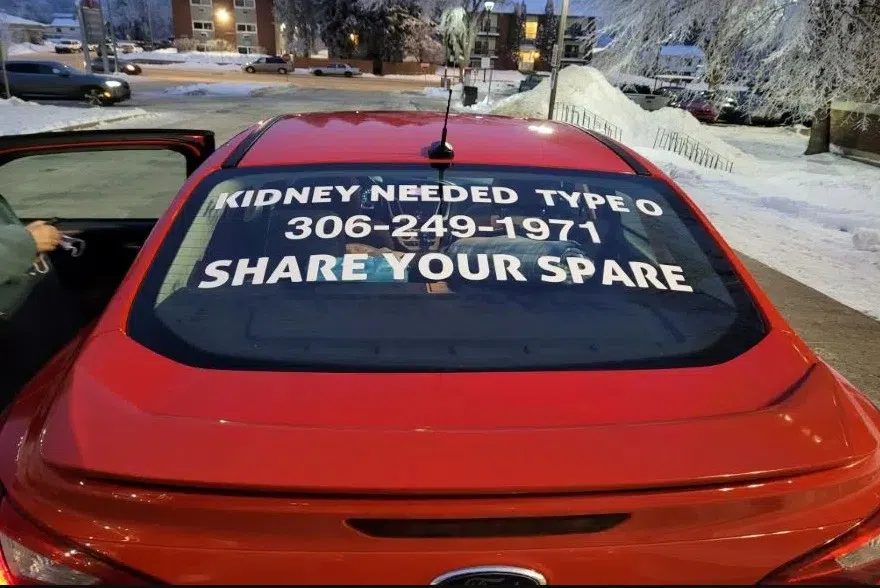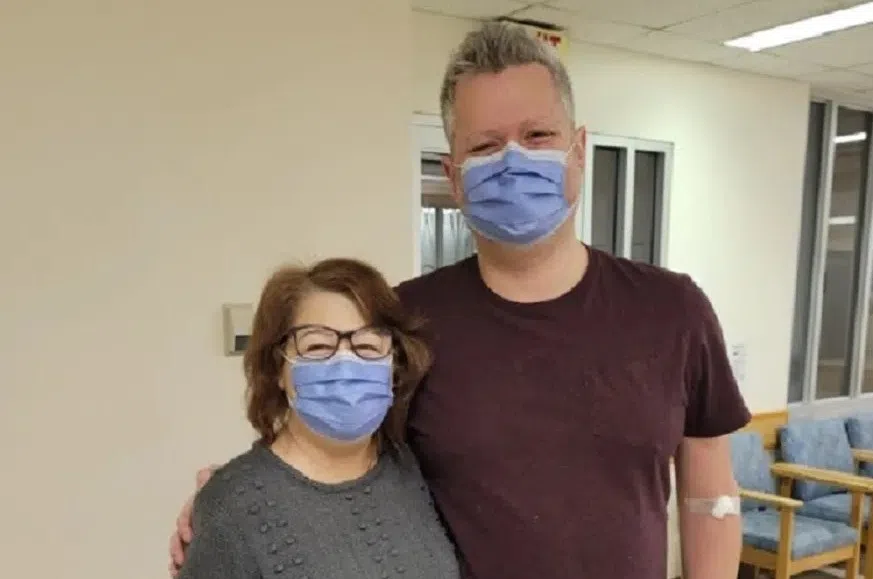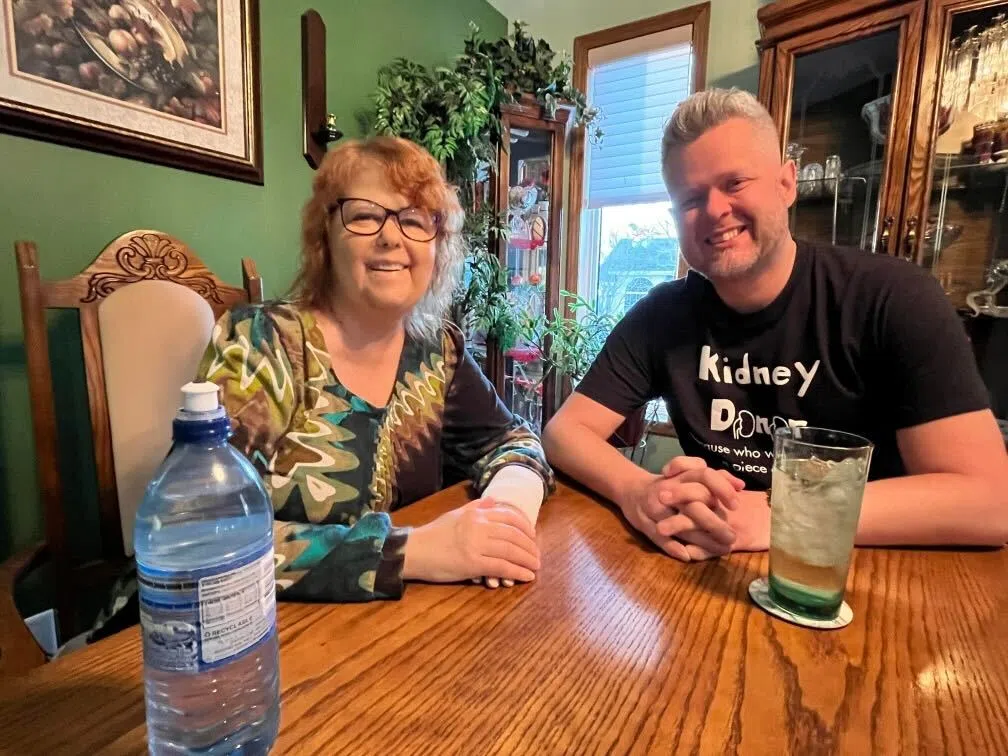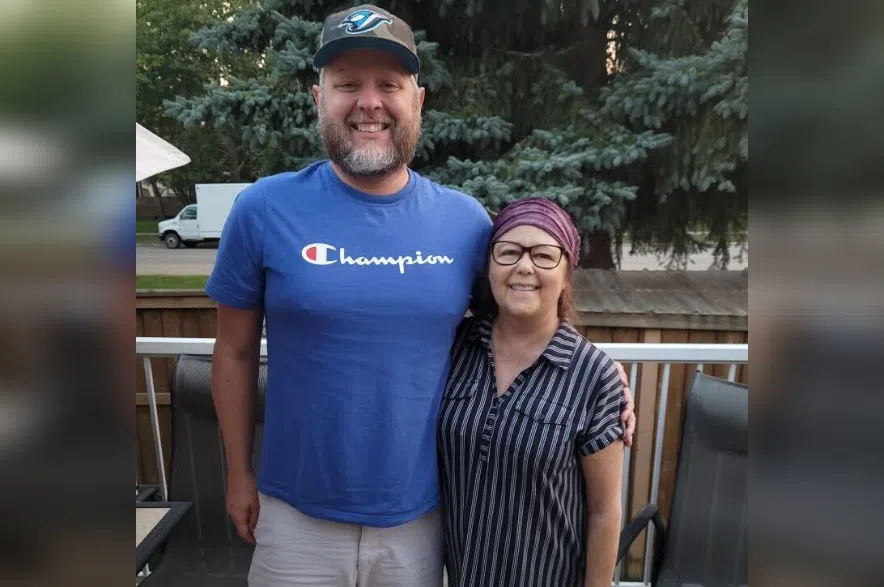Debbie Onishenko is living proof that Saskatchewan’s living donor program works.
Thanks to a kidney donation from Brent Kruger, she is alive today.
Onishenko has had diabetes her entire life, and while she kept herself as healthy as possible, in June of 2022 she had only nine per cent kidney function left and doctors were preparing her to go on dialysis.
She was already on a donor list, but decided to take matters into her own hands.
Read more:
- ‘We are family,’ says Saskatoon woman recovering from kidney transplant after placing ad on her car
- Sask. Air Ambulance aircraft upgraded to help complex patient needs
- The gift of life: How two organ donors saved Saskatoon’s Emma Crawley
She put a sign on the back of her car, looking for someone who would donate a kidney. Kreuger saw the ad and knew he had to give Onishenko a call.
It turned out that they were a perfect match.
Years later, Onishenko and Kruger are still friends and stay in touch.
They recently joined the Evan Bray Show to discuss the importance of living donors in Saskatchewan during Living Organ Donation Week, which runs from Sept. 7 to Saturday.
Listen to the full interview with Onishenko and Kruger, or read the transcript below:
The following questions and answers have been edited for length and clarity.
EVAN BRAY: Debbie, can you tell us about the situation you were in that led you to put this sign on the back of your car?
DEBBIE ONISHENKO: I was really desperate for a kidney. I was a little scared to ask people to donate their kidney, but then I had seen another person in Ontario put a sign on the back of his car, and he received a kidney. So I thought, “I’ll give it a try too!” I put the sign on, and we had several people call to donate. After some testing and things like that, it came down to one wonderful man, Brent. It literally saved my life.

The ad on the back of Debbie Onishenko ‘s car in 2022, when she was looking for a kidney donor. (Submitted)
On your car, the sign read “KINDEY NEEDED, TYPE O, SHARE YOUR SPARE” along with your number. But being Type O wasn’t enough, right? Was there more testing that needed to happen?
ONISHENKO: Oh, so much more. That’s just the start. Each person who is wonderful enough to try to donate goes through a variety of tests. It goes through whether your blood type matches, antibodies, how healthy that person is to be able to donate and go through the surgery and support systems. I was lucky to have a family and friends and everybody who was wonderfully supportive.
I can’t imagine what the wait time was like. From the time that you would get calls, which is an exciting call to get, to the time at which the testing is done and you actually find out you found someone who can help you.
ONISHENKO: Exactly. You’re honestly just hoping every day that things keep going in the right direction. Several people, of course, were eliminated along the way, but Brent was a miracle. He kept going, and he made the time to go through all these tests quicker, and once he went through all these tests and everything from when he called me in August (2022), and we had our surgery on Feb. 28 (2023).

The testing process was a lot more than just confirming the right blood type. Debbie Onishenko said there are a lot of tests involved before a kidney can be donated. (Submitted)
Brent, when did you see this sign on her car? Or did someone tell you about it?
BRENT KRUGER: Every night before I went to sleep, I just look at Google News, and just kind of scrolled through the local news and that picture of Debbie’s back window jumped out of the screen at me. I clicked on the link to the story and I read it, and it was like a light bulb went on. I knew I had to get some more information. The next day I called the number on the picture.
When people are asked to give, we think of digging into our wallets and giving. This takes giving to a whole different level. Had this even entered your mind before that night when you saw this news story?
KRUGER: Definitely not to this level. I was a regular plasma donor and blood donor, but to take this step and donate an actual organ, that’s a bit of a jump.
I just keep thinking about the process of me seeing the story and telling my wife about it. She told me to kind of hold off and let’s talk about it. But much to her frustration, I kind of jumped the gun without talking to her and I phoned the number anyway.
At what point, Brent, in this process, did you know you were going to do this?
KRUGER: It was immediately. There was no shadow of a doubt that I was gonna do it. It was instantaneous.
I want to hear from both of you what life has been like after surgery. Debbie, maybe I could start with you on this.
ONISHENKO: The recovery time takes a while. I was in the hospital for about a month. I must say, St. Paul’s Hospital and the kidney clinic there and all those doctors are absolutely amazing. They helped me through everything. Got me back up on my feet. By the time I got home, I was feeling wonderful.
As time went on, slowly for me, I gradually got better and better and stronger and stronger, and I’d honestly forgotten how good it felt to feel healthy.

Months after the surgery, Debbie Onishenko hosted Brent Kruger and his wife, Allison, for Easter supper. (Lara Fominoff/650 CKOM)
Brent, what about you after surgery? Did this change your life in any way?
KRUGER: It absolutely changed my life. It made me super grateful for the health that I do have, and that I was able to share that health with somebody else.
One of the most profound things for me was seeing Debbie after the surgery. I went out to her recovery room and I almost had to ask her if somebody had done her makeup before I came to see her, because the colour of her face was completely different 24 hours after the surgery.
But recovery-wise, I bounced back about four weeks after the surgery. It was a bit rough for the first three weeks after the surgery, but my work was so generous and let me take the time off. If it weren’t for the scars from the surgery, I would never know that I donated a kidney.
Has this formed into a special bond between the two of you?
ONISHENKO: Oh, absolutely. We are great friends. My husband and I, and Brent and Allison (Brent’s wife), it’s like we knew each other forever, from the first moment we met. We still get together a lot.
And your health is still good, Debbie?
ONISHENKO: It’s really good. This kidney of mine, I call him Stitch, is fabulous.
Debbie, what’s your message to people out there who are still on a wait list? As of July of this year, 107 adult patients are waiting to receive a kidney in Saskatchewan.
ONISHENKO: Keep hope up. You never know when something wonderful is going to happen, but be an advocate for yourself. Sometimes family members aren’t matches, so go out there and find one. I advertised, and it worked. You have to keep up and keep trying, and then you’re going to find wonderful people like Brent out there who are going to help you.
Brent, what’s your message to people listening who may be apprehensive about this notion of being a living donor?
KRUGER: When I saw that news story, I had almost an out-of-body sense that I needed to do this. If you see a story or hear of somebody on Facebook, a friend, family member, and you have that inkling that you should at least make the phone call, I would encourage that person not to hesitate and make that phone call, because you might be able to save someone’s life.
Seeing Debbie live her life to the fullest now, that’s what it’s all about. If I can encourage anyone to give a part of themselves, I would absolutely do it. I keep saying if I could give another kidney, I absolutely would, to see another person thrive in life.

Brent Kruger and Debbie Onishenko remained friends after the surgery. “I made a friend for life, absolutely,” Onishenko said in a previous interview. (Brent Kruger/Submitted)
—with files from 650 CKOM’s Lara Fominoff










